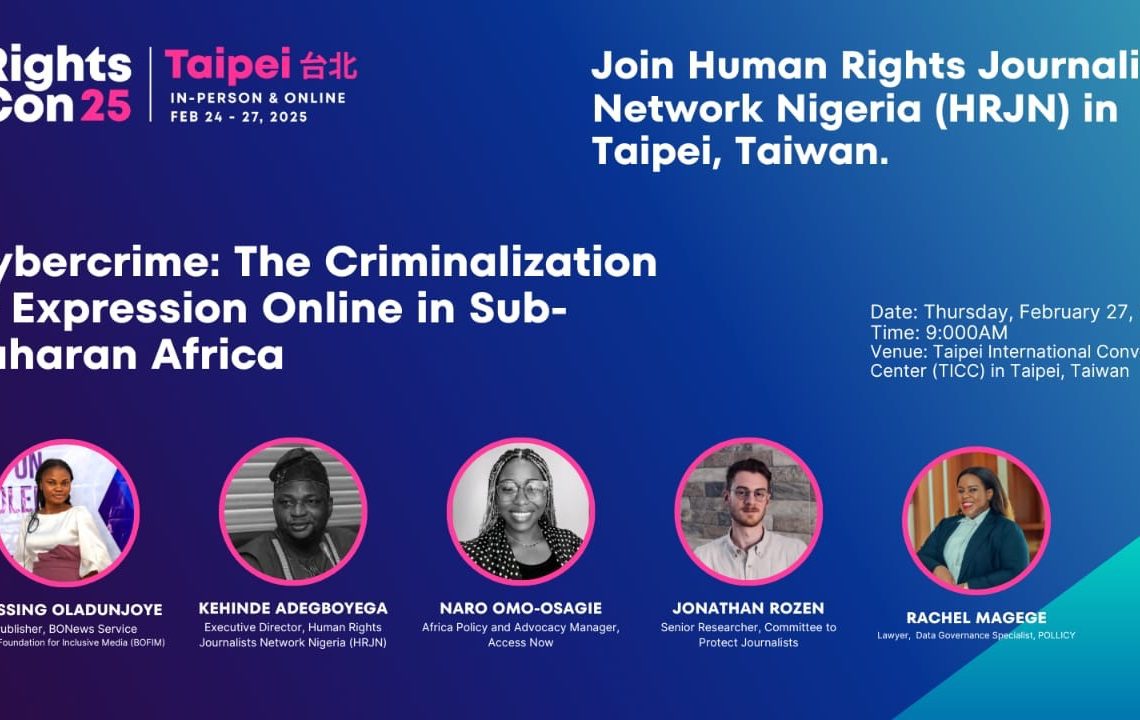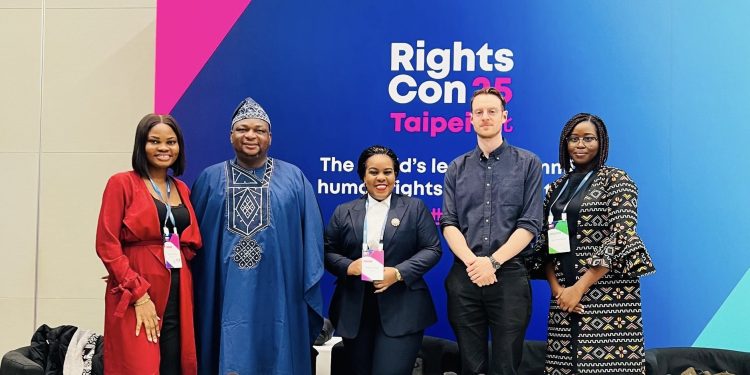In a growing trend across Africa, governments are leveraging cybercrime laws to restrict freedom of expression and silence journalists and hinder Human Rights Defenders (HRDs) from holding government accountable.
Digital rights experts, human rights defenders and journalists flagged that these laws, often introduced under the guise of cybersecurity and hate speech regulations, are being weaponized against the press and civil society.
The experts spoke during a session hosted by the Human Rights Journalists Network Nigeria (HRJN) in collaboration with the Committee to Protect Journalists (CPJ- Africa) at RightsCon 2025, the world’s leading summit on human rights in the digital age, which held in Taipei, Taiwan between February 24-27, 2025.
During the session titled ‘Cybercrime: The Criminalization of Expression Online in Sub-Saharan Africa’, which was moderated by Blessing Oladunjoye, Co-founder of HRJN and Publisher of BONews Service, participants and speakers raised concerns over the implication of these laws in sustaining democracy in the region.

One of the panelists, Jonathan Rozen, Senior Researcher at Committee to Protect Journalists, noted that many cybercrime laws contain vague provisions that allow authorities to prosecute journalists for sharing news online.
Rozen said, “these laws have been expanded in countries like the Democratic Republic of Congo, Benin, and Nigeria to justify jailing reporters under the pretext of maintaining national security.”
While sharing the case of a journalist in the DRC, Stanis Bujakera Tshiamala, a correspondent for Jeune Afrique, who was arrested on September 8, 2023, over the news website’s report about the military intelligence’s possible involvement in the murder of an opposition politician, Rozen said actions like this send “chilling messages to other journalists.”
Similarly, Naro Omo-Osagie, Africa Policy and Advocacy Manager, Access Now, pointed out that while cybercrime laws were originally intended to address crimes such as hacking and fraud, they have been repurposed to criminalize online speech.
Omo-Osagie cited Ethiopia’s cybercrime law, which punishes individuals for online speech deemed to be ‘threatening or intimidating,’ a vague standard that can be arbitrarily applied.
Similarly, she noted that “the Nigeria’s cybercrime law, even after the amendments in 2024 is even worse because the language reads that anybody who sends a message that is grossly offensive…knows to be false, for the purpose of causing annoyance, or inconvenience, to another person…. Or anyone who transmits a communication through a computer system intended to bully or harass another person.”
In Zambia, Omo-Osagie noted that the cybercrime law criminalizes defamation and prescribes prison terms for spreading information that ‘causes damage to a person’s reputation’ or subjects them to ‘public ridicule or embarrassment.
She explained that the languages used in these laws are “clear tactic to suppress dissent and independent journalism,” and added that “because these laws exist, the rich and powerful use them to shield themselves from criticism.”

Also speaking, Kehinde Adegboyega, the Executive Director of HRJN, argued that cybercrime laws are not truly being used to combat cyber threats but rather to control narratives and stifle opposition voices.
“We believe we are in an advanced democracy, yet issues such as forced disappearances and unlawful surveillance persist. The cybercrime unit of the Nigerian Police is being used to track and attack journalists rather than focus on actual cybercriminals,” he said.
Rachel Magege a legal professional and data expert underscored the role of the judiciary in sustaining and enforcing these laws, stressing that “the government controls how the judiciary responds to these cases, often imposing legal barriers that prevent journalists from challenging these laws.
She however noted that “it is crucial that people at the grassroots level understand these legal frameworks so they can resist abuses.”
Recommendations shared by participants at the session included litigations at regional courts such as the ECOWAS Community Court and the African Court on Human and Peoples’ Rights. Such actions participants shared would enable African Governments to protect the rights of journalists and human rights defender.
Another participant also recommended the involvement of local and international chambers of commerce as governments would refrain from attacking journalists and HRDs if they know that their actions would affect their country’s economy.
A final recommendation was the need for stronger solidarity and collaboration among civil society actors across the region to provide a common voice against cybercrime laws that violate freedom of expression online.

